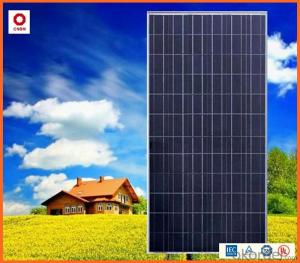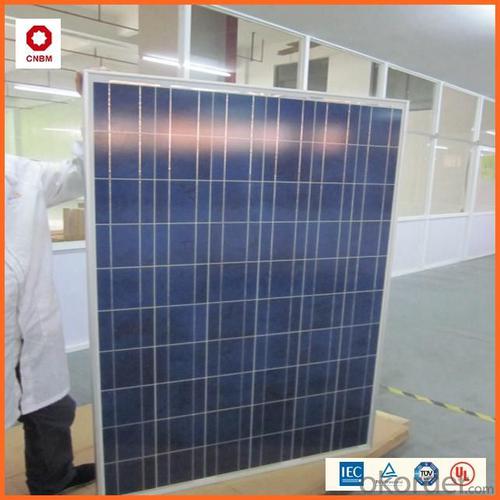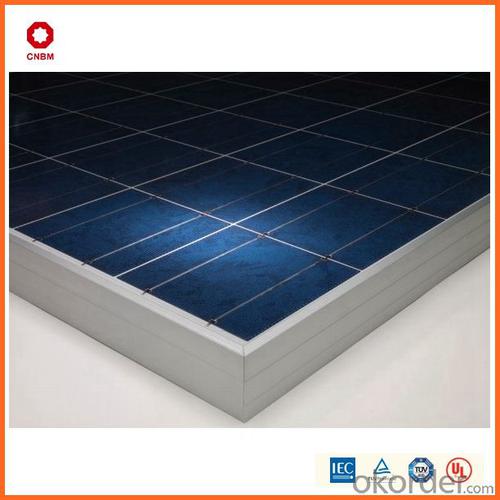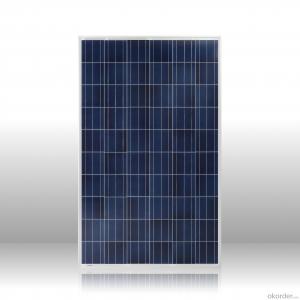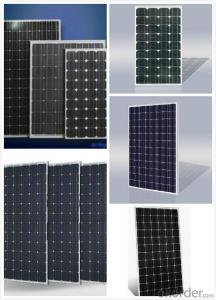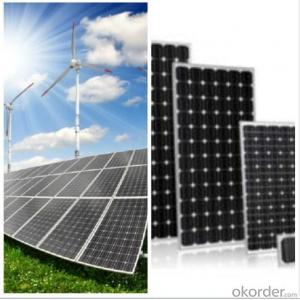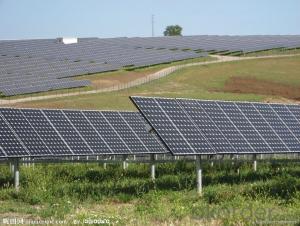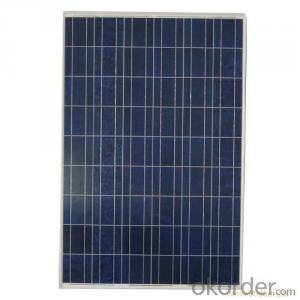Various Solar Energy Systems - 250W Poly Solar Panel 0.45/W A Grade Good Quality
- Loading Port:
- China main port
- Payment Terms:
- TT OR LC
- Min Order Qty:
- 1 watt
- Supply Capability:
- 10000000 watt/month
OKorder Service Pledge
OKorder Financial Service
You Might Also Like
Product Description:
Hot Sale !!! Quality and Safety of 245w-320w Poly Solar Panel
1. Rigorous quality control meets the highest international standards.
2. High-transmissivity low-iron tempered glass, strong aluminium frame.
3. Using UV-resistant silicon.
4. IS09001/14001/CE/TUV/UL
Warranties of 245w-320w Poly Solar Panel
1. 10 years limited product warranty
2. 15 years at 90% of the minimal rated power output
3. 25 years at 80% of the minimal rated power output
Technical date of 245w-320w Poly Solar Panel
ITEM NO.: | Mono 125*125 cell ,36pcs . Power range from 80Wp-100Wp | ||||||||
Maximum Power(W) | 80 | 85 | 90 | 95 | 100 | ||||
Optimum Power Voltage(Vmp) | 17.81 | 17.89 | 17.94 | 17.99 | 18.06 | ||||
Optimum Operatige Current(Imp) | 4.78 | 4.91 | 5.12 | 5.35 | 5.59 | ||||
Open Circuit Voltage(Voc) | 21.98 | 22.05 | 22.14 | 22.28 | 22.45 | ||||
Short Circuit Current(Isc) | 4.95 | 5.15 | 5.36 | 5.65 | 5.84 | ||||
Solar Cell: | 125*125 Mono | ||||||||
Number of Cell(pcs) | 4*9 | ||||||||
Brand Name of Solar Cells | JA Cell, Bluesun Cell | ||||||||
Size of Module(mm) | 1580*808*35 | ||||||||
Caple & Connector Type | Pass the TUV Certificate | ||||||||
Frame(Material Corners,etc.) | Aluminium-alloy | ||||||||
Backing (Brand Type) | TPT | ||||||||
Cell Efficiency for 100W(%) | 15.8% | ||||||||
Weight Per Piece(KG) | 12.0KG | ||||||||
FF (%) | 70-76% | ||||||||
Junction Box Type | Pass the TUV Certificate | ||||||||
Tolerance Wattage(e.g.+/-5%) | ±3%, or 0-3% | ||||||||
Front Glass Thikness(mm) | 3.2 | ||||||||
Temperature Coefficients of Isc(%) | +0.04 | ||||||||
Temperature Coefficients of Voc(%) | -0.38 | ||||||||
Temperature Coefficients of Pm(%) | -0.47 | ||||||||
Temperature Coefficients of Im(%) | +0.04 | ||||||||
Temperature Coefficients of Vm(%) | -0.38 | ||||||||
Temperature Range | -40°C to +85°C | ||||||||
Surface Maximum Load Capacity | 2400Pa | ||||||||
Allowable Hail Load | 23m/s ,7.53g | ||||||||
Bypass Diode Rating(A) | 12 | ||||||||
Warranty | 90% of 10 years,80% of 25 years. | ||||||||
Standard Test Conditions | AM1.5 1000W/ 25 +/-2°C | ||||||||
Packing | carton or pallet | ||||||||
1*20' | 25 Pallets / 450pcs | ||||||||
1*40'STD | 25 Pallets / 100pcs | ||||||||
Features of our products:
• High conversion efficiency mono/poly-crystalline amorphous silicon solar cells
• Modules incorporate high performance bypass diodes to minimize the power drop caused by shading
• High transmittance, low-iron tempered glass
• High performance EVA encapsulant to prevent destroying and water.
• AI frame: without screw, corner connection. 8 holes on the frame can be installed easily
• Good performance of preventing from atrocious weather such as wind and hails
• Certifications: CE IEC TUV VDE UL, Class I
• 10 years 90% power output warranty

Shipping of 245w-320w Poly Solar Panel
By Sea | Delivery from Shanghai or Ningbo seaport |
By Air | Departure from Shanghai Pudong Airport |
By Express | Post by DHL, EMS, UPS, TNT. |
- Q: Can a solar energy system be installed on a thatched roof?
- Yes, a solar energy system can be installed on a thatched roof. Thatched roofs are made of natural materials like straw or reed, which can pose some challenges for installation. However, with proper planning and precautions, it's possible to mount solar panels on a thatched roof. The installation process may require additional measures to ensure the integrity of the roof and prevent any damage to the thatching materials.
- Q: Can solar energy systems be used in powering telecommunications towers?
- Yes, solar energy systems can be used to power telecommunications towers. Solar panels can be installed on the towers or nearby to capture sunlight and convert it into electricity. This clean and renewable energy source can provide a reliable power supply for telecommunications equipment, especially in remote or off-grid locations where access to traditional power sources may be limited or costly. Additionally, solar energy systems can help reduce operating costs and dependency on fossil fuels, making them an environmentally friendly choice for powering telecommunications towers.
- Q: Can solar energy systems be used for powering off-grid eco-hospitals?
- Yes, solar energy systems can be effectively used for powering off-grid eco-hospitals. Solar panels can be installed to harness and convert sunlight into electricity, providing a sustainable and renewable source of power. This can help reduce dependency on traditional energy sources and mitigate the environmental impact of hospitals. Additionally, solar energy systems can be combined with battery storage solutions to ensure a continuous power supply even during periods of low sunlight or at night. This makes solar energy an ideal choice for off-grid eco-hospitals, promoting both environmental sustainability and energy independence.
- Q: Can solar energy systems be used to charge electric vehicles?
- Yes, solar energy systems can definitely be used to charge electric vehicles. Solar panels generate electricity by converting sunlight into electrical energy. This electricity can be used to charge the batteries of electric vehicles, allowing them to run on clean and renewable energy. Many individuals and businesses are installing solar panels on their rooftops or in dedicated solar carports to harness solar power and directly charge their electric vehicles. This not only reduces their reliance on the grid but also helps to reduce greenhouse gas emissions and combat climate change. Additionally, there are also portable solar chargers available that can be used to charge electric vehicles on the go, making solar energy an increasingly popular and sustainable option for powering electric vehicles.
- Q: Can solar energy systems be installed on recreational vehicles?
- Yes, solar energy systems can be installed on recreational vehicles. These systems are specifically designed to provide power to RVs and can help owners generate electricity for appliances, lighting, and other electrical needs while on the road or camping.
- Q: Can solar energy systems be used in areas with limited access to the electrical grid?
- Yes, solar energy systems can be used in areas with limited access to the electrical grid. Solar energy is a decentralized and off-grid solution that can be deployed in remote or off-grid locations. It provides a reliable and sustainable source of electricity, especially in areas where grid infrastructure is lacking or unreliable. Solar systems can be easily installed and can power homes, businesses, and even entire communities, allowing them to have access to electricity without relying on the traditional electrical grid.
- Q: Can a solar energy system be installed on a warehouse or industrial facility?
- Yes, a solar energy system can be installed on a warehouse or industrial facility. In fact, these types of buildings often have large roof spaces or open areas that are ideal for installing solar panels. This can help the facility reduce its dependence on traditional energy sources, lower electricity costs, and contribute to a more sustainable and environmentally friendly operation.
- Q: Can solar energy systems be installed on roofs?
- Solar energy systems can indeed be placed on roofs. In fact, rooftops are a popular choice for solar panel installations. One key benefit of installing solar panels on roofs is that they make use of existing space, eliminating the need for extra land. Moreover, rooftop solar installations offer the advantage of being unimpeded by shade caused by trees or buildings, maximizing sun exposure and electricity generation. Additionally, rooftop installations often prove cost-effective, as they reduce the requirement for long-distance transmission lines and directly supply power to the building. All in all, installing solar energy systems on roofs is a pragmatic and effective means of harnessing clean, renewable energy.
- Q: How does the efficiency of solar panels vary between manufacturers?
- The efficiency of solar panels can vary significantly between manufacturers due to several factors. One of the primary factors is the quality of the materials used in the production of the solar panels. High-quality materials, such as monocrystalline silicon, tend to result in higher efficiency panels compared to those made with lower-quality materials. Manufacturers also employ different manufacturing processes, which can affect the efficiency of solar panels. For example, some manufacturers may have more advanced and precise techniques that result in higher efficiency panels. Additionally, the level of experience and expertise of the manufacturer can also play a role in the efficiency of their solar panels. Furthermore, the design and engineering of the solar panels can impact their efficiency. Some manufacturers may invest more in research and development to optimize the design of their panels, resulting in higher efficiency. Factors such as the arrangement and number of solar cells, electrical connections, and anti-reflective coatings can all contribute to the overall efficiency of the panels. Moreover, the size and surface area of solar panels can also affect their efficiency. Larger panels generally have more solar cells and a larger surface area to capture sunlight, which can result in higher efficiency. However, this may also lead to higher costs and space requirements. Lastly, the testing and certification processes can also impact the efficiency of solar panels. Manufacturers that conduct rigorous testing and obtain certifications from recognized authorities tend to produce more reliable and efficient panels. In conclusion, the efficiency of solar panels can vary between manufacturers due to factors such as the quality of materials, manufacturing processes, design and engineering, size and surface area, and testing and certification. It is important for consumers to consider these factors when choosing solar panels to ensure they are getting the most efficient and reliable option for their specific needs.
- Q: Can solar energy systems be used in agricultural settings?
- Solar energy systems are certainly applicable in agricultural settings. The utilization of solar energy in agriculture has gained popularity in recent years. The installation of solar panels on rooftops or as ground-mounted systems in agricultural fields is a means to generate clean and renewable electricity. There are multiple ways to implement solar energy in agricultural settings. One prevalent application is the use of solar power for irrigation systems. Solar-powered water pumps effectively draw water from wells or other sources and distribute it for irrigation purposes. This reduces reliance on fossil fuel-powered pumps and lowers overall energy costs for farmers. In addition, solar energy can be employed to power electric fences, lighting systems, and ventilation systems in livestock operations. These systems contribute to improving animal welfare, boosting productivity, and reducing the environmental impact associated with traditional energy sources. Furthermore, solar energy can facilitate crop drying and processing. Solar dryers remove moisture from crops, minimizing the risk of spoilage and prolonging shelf life. Solar-powered processing equipment, such as grain mills and oil presses, enhance the efficiency and sustainability of agricultural practices. Moreover, solar energy systems offer a dependable source of electricity for remote agricultural areas without access to the grid. This enables farmers to acquire modern technologies, improve productivity, and increase income. Overall, integrating solar energy systems into agricultural settings offers numerous benefits. It reduces greenhouse gas emissions, decreases reliance on fossil fuels, lowers energy costs, improves efficiency, and enhances the sustainability of agricultural practices. Therefore, solar energy presents a viable and promising option for powering various agricultural activities.
Send your message to us
Various Solar Energy Systems - 250W Poly Solar Panel 0.45/W A Grade Good Quality
- Loading Port:
- China main port
- Payment Terms:
- TT OR LC
- Min Order Qty:
- 1 watt
- Supply Capability:
- 10000000 watt/month
OKorder Service Pledge
OKorder Financial Service
Similar products
Hot products
Hot Searches
Related keywords

